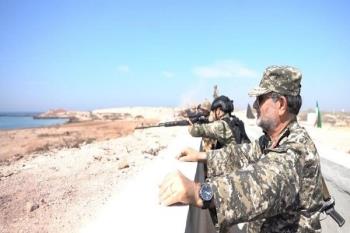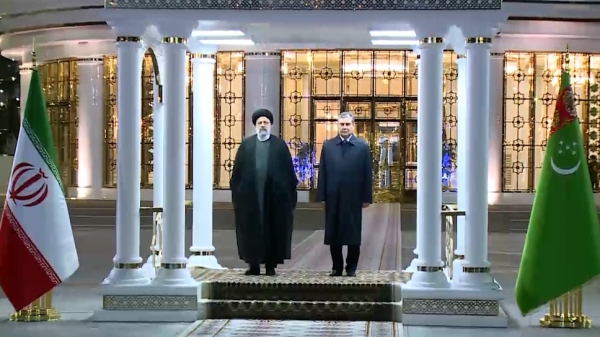Alwaght- Heading a high-ranking political and economic delegation, President Ibrahim Raisi of Iran arrived in Ashgabat on Friday at the invitation of his Turkmenistani counterpart Gurbanguly Berdimuhamedow to take part in the Economic Cooperation Organization (ECO) summit.
The visit of the Iranian president to the 15th ECO summit in addition to strengthening relations between Tehran and Ashgabat can be highly important in implementing the foreign policy strategy of the new Iranian government to expand economic cooperation with neighbors.
But there are some questions: What are the ECO capacities that help mitigate the anti-Iranian sanctions effects and boost the Islamic Republic's foreign trade? What is the organization's current place in the regional trade?
Bolstering bilateral ties with Turkmenistan
During President Raisi's visit, strengthening relations between Tehran and Ashgabat was a paramount agenda. In the context of Iran's special focus on Central Asia after joining the Shanghai Cooperation Organization, it seems that Turkmenistan will also be one of the important countries with which President Raisi's administration will seek to expand cooperation. The meeting of him and the Turkmenistani president, thus, was extremely significant.
Many political observers now believe that the meeting between Raisi and Berdymukhamedov could play a significant role in breaking the ice of ties between Iran and Turkmenistan. From 2015 to 2020, the two countries' relations decreased by 4 percent and debts have become a ground for their cold ties. But during the meeting, the two presidents were expected to resolve the differences over Iran's debts and the pricing of exported gas. At the same time, with the resumption of gas imports from Turkmenistan, many of the current Iranian challenges related to gas pressure drop in the winter can be met. Also, at the political and diplomatic level, the meeting could help bring their stances on Central Asian issues closer.
ECO role significance and its potentials in expanding intra-member economic and trade cooperation
The ECO is the offspring of the Regional Cooperation for Development, an organization founded in 1964. The three founders, Iran, Turkey, and Pakistan, were somewhat at same level in terms of socioeconomic growth and were under the US influence. However, the advent of the Islamic Revolution ended the life of this organization. In 1985, the three countries again gathered together for fresh cooperation this time under ECO. Until 1990, the year new members came in, the organization was not considerably active.
The rebranded organization was established with the aim of raising the economic standards of life of regional people. Afghanistan, Tajikistan, Azerbaijan, Uzbekistan, Turkmenistan, Kazakhstan, and Kyrgyzstan joined it in 1992. Expanding regional and trans-regional trade and integrating the regional and global trade were the main goals. In this year's summit, these goals were also highlighted.
The fact is that the composition and geo-economic structure of ECO members contain tremendous opportunities to contribute to economic development and growth and increase the welfare of the people of these countries, but so far this potential has not been fully utilized. Low level of trade among the members, 7.7 percent in 2018, and scanty intra-member investments bear witness to this inefficiency.
ECO member countries have common opportunities and threats that can pave the way for increased economic cooperation with each other. Cooperation boost can create interests and push away the threats and challenges in security, environment, and diplomacy. Meanwhile, expansion of partnership with Pakistan, Turkey, Afghanistan, and other members can bring substantial economic interests for Iran.
Need for addressing the challenges: New Iranian administration should care about role in ECO
Ashgabat visit, Raisi's second foreign trip as president of Iran since he took office on August 3, is a signal Tehran is focusing on relations with neighbors under new government. The fact is that in the previous administration in Iran, Central Asia was given a marginal place in the foreign policy. Iran's trade volume with Central Asia has dropped significantly to less than a third of 2013 volume over the past eight years, and political differences with these countries have reached a peak in recent years. But under President Raisi, attention to Central Asia and neighboring states take a center stage in Tehran's foreign policy.
Trip to Tajikistan in early September for Shanghai Cooperation Organization's conference at which Iran, nearly two decades an observer member, was approved as a permanent number is a indication to new approach by the Islamic Republic. With the new approach, ECO can be a place where Iran's foreign trade can be advanced and even cruel and illegal sanctions neutralized.
Iran's Deputy Foreign Minister for Economic Diplomacy Mahdi Safari who was in Ashgabat at a meeting of the ECO foreign ministers asserted that "active participation" in the organization is a "priority to the Islamic Republic of Iran." Actually, active presence in ECO is encouraged by a new approach by Tehran that departs from tying national economy to an agreement with the West on the nuclear program.
Given the major ECO potentials, Tehran's active role and boost of trade with members is a crucial path avoiding tying the Iranian national interests to the West and smart confrontation of the illegitimate sanctions. Beside its economic significance, active role in ECO can help make a balance in the country’s foreign policy. Adoption of the new approach increasingly adds to the Iranian bargaining power in dialogue with the West that is starting on Monday. Coincidence of President Raisi's presence in ECO summit with the nuclear talks with world powers even sends for the West a clear message of Iran play capabilities.



























